Cynthia
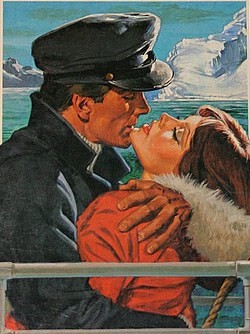
In her column Nice Girls Don't Read Romances, she examines the interesting question as to who actually reads romancing novels (or Harlequin romances as they're also known as due to publishing giant; Harlequin Entreprises Ltd). Come to think of it, who hasn't wondered when waiting in line to pay at the counter of the local grocery shop? There they are, next to the more mainstream titles off of the best seller's list, these novels with cheesy and sometimes ridiculous art work displaying the backside of a bulky male, passionately embracing his woman, with amusing titles which sound like they were scripted by the niftiest of kids in a poerty work shop at school (How about; Quiet Walks the Tiger, Liar's Moon, Tender Deception or Tempestous Eden?)
Heimel shares with readers her initial assumptions on who the targeted group is, before reading one herself: Trashy women. The women who are always wearing housedresses or polyester pantsuits when out and who will drool in the subway or at airports over doll-like women with raven black hair (they always have raven hair it seems), long legs, high breasts and tiny wastes getting ravished by the rugged hands of a brooding man. Heimel concludes by outing her own friends as readers of the romance novel and by confessing to getting it (read: the glory of the romancing novel) Could it be one of those do-but-not-talk-about-things?
Heimel offers her own discription of the genre as; "masturbation books" or "romance pornography" and consequently also includes the differences as she sees them between men's and women's pornography. In this so called "romance pornography" the women crave their men to be honourable, to have valor, social standanding and morality and there is also a focus on beautiful locations, wheras in men's pornography it will basically suffice if the women just have "tits" and "beg for it".
Apart from excerpts of this genre in question I'm denying any familiarity with it, but who knows what summer has in store?
Carla

What's amusing with France's First Lady is the feeling of having known of her for longer than most people have been able to count 'til 10. Although it feels like half a life-time ago, one remembers Bruni as a reigning model in the 90's in the age of the Valettas, rather than during the 80's rule of the Turlingtons and Evangelistas. In the 90's she would be equally known for her liasions with such royalties as Eric Clapton, Donald Trump and Mick Jagger. Whatwith the Internet being plastered with nude (yet tasteful and sometimes exquisite, in Bruni's defense) pictures of her some would likely toy with the idea of Bruni being yet another tart turned lady by age. Adding to the story, a character based on her was featured in her sister's (ultra-talented director/actress Valeria Bruni-Tedeschi, most notably known for her fine performances in Francois Ozon's 5x2 and Time to leave) autobiographical directorial debut, It's Easier for a Camel, about their upbringing in a wealthy priviliged Italian family. Not too pleasing for Carla, she was potrayed as a difficult bitch.
Now the former president of the U.S, George W. Bush, was quoted telling Sarkozy in a press conference on his visit to France; "It was a great pleasure to have been able to meet your wife. She's a really smart, capable woman, and I can see why you married her." In the public eye she may be Mrs Sarkozy from now on but Bruni is no stranger to talent of her own. Having studied the piano, violin, and guitar while growing up, Bruni surprised both the public and the critics with whom she gained plenty of acclaim when releasing her debut album, Quelqu'un m'a dit, in 2002. Produced and written entirely by Bruni herself, the album is absolutely enchanting with its low key chansons and sometimes perfect lyrics, coming across as effortless.
La dernière minute
Quand j'aurai tout compris, tout vécu d'ici-bas
Quand je serai si vieille, que je ne voudrai plus de moi,
Quand la peau de ma vie sera creusée de routes,
Et de traces et de peines, et de rires et de doutes,
Alors je demanderai juste encore une minute...
Quand il n'y aura plus rien qui chavire et qui blesse,
Et quand meme les chagrins auront l'air d'une caresse,
Quand je verrai ma mort juste au pied de mon lit,
Que je la verrai sourire de ma si petite vie,
Je lui dirai "écoute ! Laisse-moi juste une minute...
Juste encore minute, juste encore minute,
Pour me faire une beauté ou pour une cigarette
Juste encore minute, juste encore minute,
Pour un dernier frisson, ou pour un dernier geste,
Juste encore minute, juste encore minute,
Pour ranger les souvenirs avant le grand hiver,
Juste encore une minute... sans motif et sans but.
Donald

I'll tell you everything i know
any little thing i know
i'll tell you everything i know
any little things i know
you've got a lovely way with words
must be the way you see the world
it's just the way you see the world
...
I went down to your house last weekend
you said, "come on man, you don't have to point out
everything that's bad.
so there's a broken mirror on my bed
I'll clean it up,so what?
you don't have to be such an asshole all the time."
Aww don't be like that.
The Virgins- Rich girls.
(above) Donald Cumming, the singer of The Virgins, as photographed by Ryan McGinley (below).
Ingrid

Chopin Prelude op 28 nr 2
-Käraste lilla Ewa...
-Är det allt du kan säga?
- Nej, jag blev bara så rörd.
-Tyckte du om det?
- Jag tyckte om Dig.
-Jag förstår inte vad du menar...
-Kan du inte spela någonting annat nu när vi har det så skönt?
-Jag vill veta vad jag gjorde för fel.
-Nej, du gjorde inget fel.
-Du tyckte tydligen inte om mitt sätt att spela det här preludiet?
-Men var och en måste ju ha sin uppfattning...
-Ja juste, nu vill jag veta din.
-Men du är ju ond redan...
-Nej, jag är ledsen för att du tydligen inte tycker att det är mödan värt att berätta hur du själv ser på det här preludiet.
-Nåja,om du absolut vill. Vi bortser från det rent tekniska som inte var så tokigt, trots att du gott kunde ha intresserat dig en smula mer för Cortos fingersättningar eftersom det ger en viss hjälp för tolkningen men för all del, nu ska vi bara tala om uppfattningen...Chopin var känslostark, inte känslosam, det är en avgrund mellan känsla och sentimentalitet. Preludiet du spelar talar om återhållen smärta utan drömmerier. Du måste vara lugn, klar och kärv. Se bara första takterna... Sen en kort lindring men den förflyktigas nästan genast och sen är plågan densamma. Inte större, inte mindre. Behärskningen är hela tiden total. Chopin var stolt, sarkastisk, hetsig, plågad,Ewa...och mycket manlig, inte en känslomässig kärring.
Det här andra preludiet måste nästan spelas fult, får aldrig bli insmickrande, det ska låta fel. Mödosamt eller framgångsrikt genomkämpat.
-Jag förstår.
-Bli inte ledsen på mig Ewa.
-Varför skulle jag bli ledsen? Tvärtom.
När jag var barn beundrade jag dig varnsinnigt. Så var jag trött på dig och dina pianon i många år men nu har jag börjat beundra dig igen. Fast på ett annat sätt.
-Då finns det ju hopp!
-För all del.
From Ingmar Bergman's Autumn Sonata.
Nan
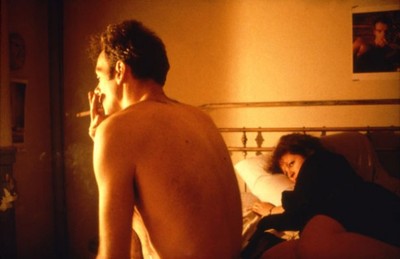
Nan Goldin- The Ballad of sexual dependency
The light, the colours, the cigarette, the positions on the bed and the overall feel of this frame.
Hands down last year's best exhibition in Stockholm, at Kulturhuset.
Bette
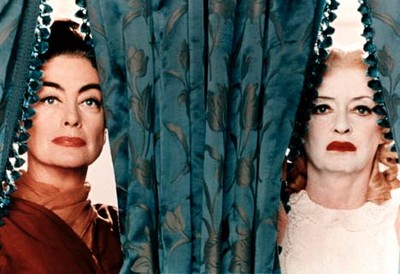
Star wars
If there was ever a rivalry and feud that outshone the rest, the one between legendary actresses Bette Davis and Joan Crawford was likely it. What originally fuelled the falling out of the two was actor Franchot Tone who was the object of affection of both, who Davis fell in love with but Crawford married in the mid 30's. From thereon bad blood is said to have remained between them until the death of Crawford in 1977. Although numerous memorable remarks were made about the other by both during their neverending sparring (Davis about Crawford: "She slept with every male star in MGM except for Lassie." Crawford on Davis: "Working with Bette Davis was my greatest challenge and I mean that kindly. She liked to scream and yell. I just sit and knit. During the filming of What ever happened to Baby Jane?, I knitted a scarf from Hollywood to Malibu...") the one made by Davis upon learning about Crawford's death may be the one revealing to what extent there was animosity between them. Davis simply said: " You should never say bad things about the dead, only say good. Joan Crawford is dead. Good."
Joan Crawford saw her finest hour with her performance in 1945's Mildred Pierce with which her popularity reached its peak and also earned her her only Academy Award (The role was previously offered to Davis who passed.) Although considered a screen legend, Mildred Pierce is the only piece in Crawford's body of work that qualified as a true classic. Never as glamorous as her rival, Davis made a name for herself by bold choices and originally taking on roles other actresses would not take on, relying more on her talent than looks. Davis was outspoken and had the image of a tough lady who refused to comply with the standards of the industry. By the late 40's and early 50's the careers of both actresses were on the decline. However, Bette Davis had a short but very significant resurrection when landing the role of a lifetime as Margo Channing in the classic All About Eve from 1955. Her performance in it is widely held as one of the all-time best performances by a female actress. In the heydays of Davis and Crawford, studio executives would be trying to pair the two actresses two headline a film, however, without any luck due to disagreements. In 1962 Davis and Crawford set their differences aside to finally co-star in Whatever happened to Baby Jane?, hoping to revisit their past glory. By this time a project involving the two aged dames was hardly a guarantee for financial success and the head of Warner Bros, Jack. L Warner, was originally quoted saying that he wouldn't want to spend a nickel on either one of those two "old broads".
Joan Crawford had previously done advertisements for Pepsi and was also affliated to the brand by having been married to the former CEO, why Bette Davis had a Coca Cola-machine installed on the set of the film. Returning the favour, Crawford forbid her twin daughters to interact with Davis' daughter. The last great installment of the feud came when Davis was nominated for an Academy Award for her part in the film, desperately wanting to win her third Oscar which would have set a new record for numbers of Oscars won by an actress (The record was later held by Katherine Hepburn).Crawford is believed to have actively campaigned against Davis' potential win and even accepted the Oscar that night on the behalf of winning actress Anne Bancroft who was absent from the show. Davis being Davis never forgave Crawford for her stunt.
Towards the end of their lives both Crawford and Davis experienced their share of personal tragedy. During a time when unauthorized kiss-and-tell stories had yet to hit the book shelves, Crawford's daughter shocked the film industry by writing a biography (Mommy dearest) about her alcoholic mother, including stories of child abuse and neglectance. Later Davis' daughter BD Hyman, who the former referred to as "the love of my life", wrote a similar book at a time during which her mother was battling cancer. BD Hyman likely seized the opportunity to capitalize on the success and fame of Crawford's daughter, thinking Davis wouldn't likely survive her illness anyway. Neither actress ever reunited with their daughter.
Marina
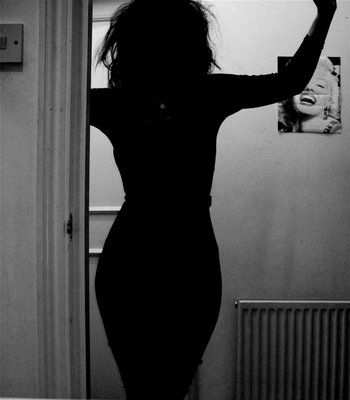
Sunday, wake up, give me a cigarette.
Last night's love affair is looking vulnerable in my bed
Silk sheet, blue dawn, Colgate, tongue warm
Won't you quit your crying? I can't sleep
One minute I'm a little sweetheart
And next minute you are an absolute creep
We've got obsessions
I want to wipe out all the sad ideas that come to me when I am holding you
We've got obsessions
All you ever think about are sick ideas involving me, involving you
We've got obsessions
I want to erase every nasty thought that bugs me every day of every week
We've got obsessions
You never tell me what it is that makes you strong and what it is that makes you weak.
Marina & the Diamonds- Obsessions.
Bret

Although I have yet too see it, that is if it ever sees daylight around these shores whatwith its obvious off-beat feel and consequently limited appeal to the masses (given Ellis' bankable name, it doesn't come across as implausible that it will), I'd think Gregor Jordan probably should've taken some cues from Mary Harron when signing up. The latter's grip on the directing and execution of American Pschyo was absolutely sensational I've come to learn having seen it a few times since its release in 2000 and it is by far the only truly good adaptation of Ellis' work yet. Let's not go into words about the mess that was the adaptation of Less than zero...
On another note, what is exciting is Ellis' bringing back Clay, the anti-hero of Less than Zero and the others back for another round in the already mentioned Imperial Bedrooms, some twenty years later and now in their middleage. Surely little has changed with (at least some of) these indifferent and laissez-faire characters still on a downward spiral to destruction, as started in the first novel. Randomly picking Less than Zero up at the bookshop 8 years ago, simply judging from the highly pleasing art work and loosely knowing about this creator of Patrick Bateman, surely qualifies as one of the best buys in the history of this household.
Photo: Guy Bourdin
Ingmar
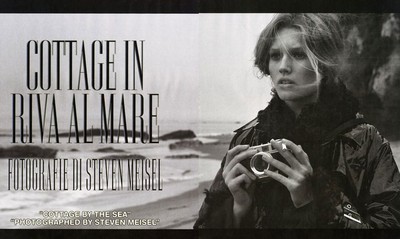

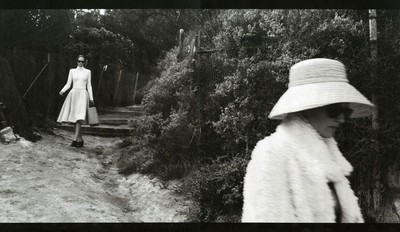
Steven Meisel lensing last year's best narrative editorial from Vogue Italia starring Toni Garrn and Katrin Thormann. Oh and yes, the shoot is indeed inspired by your favourite movie. Yes, that movie.
Nagisa

In the realm of the seses
Ultimately a tale of sexual obsession, jealousy and destructive love, Nagisa Oshima's cult picture from 1976, based on a true incident that occured in Japan before WWII, depicts the intensified nature of the extramarital relationship between a brothel worker (Sada) and the brothel owner (Kichizio). As the affair grows, so does their insatiability in relation to the other making them uncompromisingly indulge in their lusts, however elaborate and intense they may prove, even going to the lenghts of engaging in asphyxiation play. Sada's obsessiveness consumes them both and it's clear the affair will see only one of the two outliving the other. Upon realising she will never truly be the only woman in his life, she takes measures of nobody else ever having him by dismemembering his privates. In real life it's known Sada Abe was adopted a heroine in the public eye and her case became a media sensation and is supposedly stil to date one of the most famous murder cases in Japan.
Oddly enough, this outing of Oshima's is probably more shocking today than upon its original release, amidst the progressive and bold cinematic scene of the 70's independent and art house features. Indeed, it is not for the faint-hearted and contains explicit material putting even today's provocateur Catherine Breillart to shame. It remains however a powerful, yet somewhat flawed, piece of cinema.
Linda
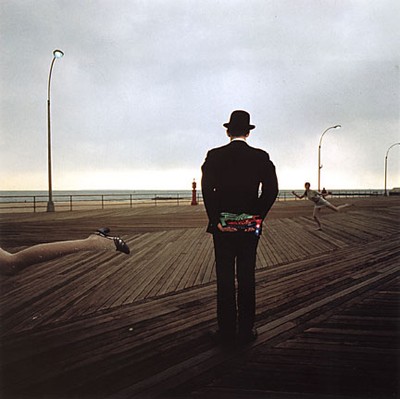
25 years and my life is still
I'm trying to get up that great big hill of hope
For a destination
I realized quickly when I knew I should
that the world was made up of this brotherhood of man
for whatever that means
And so I cry sometimes when I'm lying in bed
Just to get it all out what's in my head
And I am feeling a little peculiar
And so I wake in the morning and I step outside
And I take a deep breath
And I get real high
And I scream from the top of my lungs
What's goin' on?
-4 Non Blondes- What's up
Photo: Guy Bourdin*
*Before there ever was a David LaChapelle, there was a Guy Bourdin.
Ryan

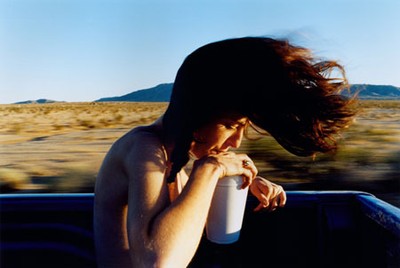
Ryan McGinley- I know where the summer goes
"Photography is about freezing a moment in time; McGinley's is about freezing a stage in a lifetime. Young and beautiful is as fleeting as a camera snap--and thus all the more worth preserving."
When first glimpsing on Ryan McGinely's work one might easily come to think of photographer/director Larry Clark (Bully, Kids, Ken Park) who may well be a distant (word stress) cousin of McGinley's, with obvious similarities extending to youth and nudity. However, while there is a deliberately provocative and exploitive nature to Clark's work on the dismal theme of; Society-gone-fucking-bad-and-when-adults-are-away-kids-will-play, McGinley rather uses nudity as an expression of the freedom tied with being young. There's a certain joie de vivre and sense of wanting to be right in there in every single frame of his, that is so remarkably captivating with Ryan McGinley, not to mention luscious.
